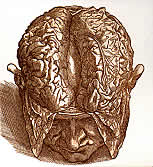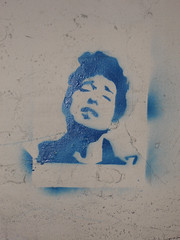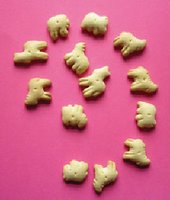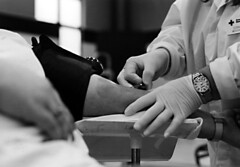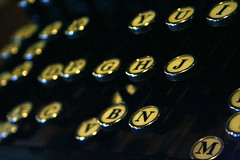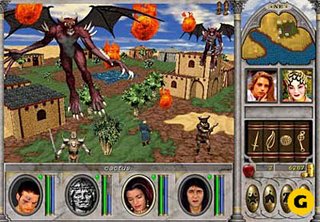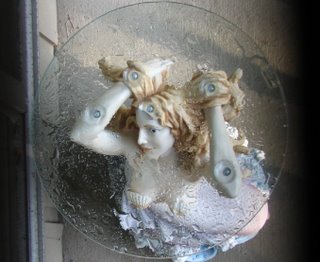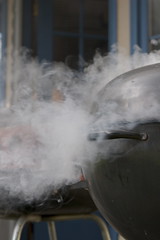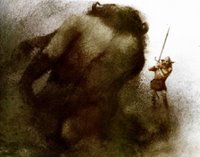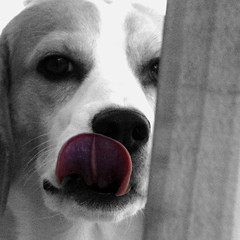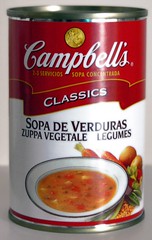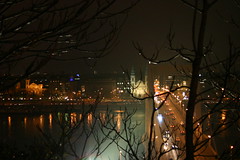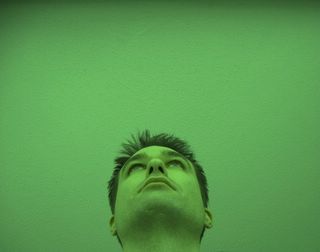He met her at the Bugle Coffee Shop on the corner of Sundry and Union Street, at 1:00 o’clock in the afternoon. He showed up fifteen minutes early so as to try to relax before she arrived, but she was already there, sitting in a booth. He grew anxious whenever meeting new people. Even more-so complete strangers that came out of nowhere with a phone message left in the middle of the night: “I have something of yours, something you lost a long time ago. If you’ll meet with me, I’ll return it.”
She had blonde hair, with about an inch of her bangs died black. They cut a sharp, even line across her forehead. She wore heavy eyeliner around green eyes. Her nose was pierced with a silver stud. She wore white fishnets, tall black clunky boots with silver buckles up the calves, a plaid skirt held together with oversized safety pins, and yet her rebellious clothes were betrayed by the crows-feet around her eyes that placed her somewhere in her mid-thirties. On the seat beside her rested a canvas sack with a drawstring.
He slid into the booth across from her. She sipped her coffee and peered at him from over the cup’s rim. He ordered a cup of tea from the waitress, and as she was walking away, the woman across from him asked for a bowl of barley soup.
They silently observed each other until the waitress returned with tea and soup. “There’s a story I want to tell you,” she said. He sipped his tea. “A young single-mother buys her little boy a toy boat. He plays with it in the bathtub until he grows tired of the small surface of water, the porcelain walls rising up on all sides. He asks his mother if he can float it out on the pond at the park. She says no, afraid that it might float beyond reach, and stretching to retrieve it, he would fall in and drown. He couldn’t swim. One morning when his mother had fallen asleep on the sofa while reading a book, he floods the bathroom. The boat sails from one side of the tiled floor to the other, but it bumps into the walls and the base of the sink. His mother finds him splashing in the shallows. She spanks him with a wooden spoon and sets the boat on the top bookshelf in the library, where he can only look up and see the top of the sails peeking out.
“After two weeks she gets down the sailboat. He brings it into the bath, laughing, playing the voices of pirates scrambling around on the deck. His mother sits on the toilet, legs crossed, elbow propped on knee, chin resting on the heel of her hand. She doesn’t know that he is faking this enjoyment to disarm her. He hatches a plan.
“On his way out the door one morning on the way to school, he slips the boat beneath his rain slicker. It has been raining for three and a half days. The gutters are swollen with run-off, parking lots become vast lakes of standing water. He walks to his bus stop, but as his schoolmates climb the steps into the bus, he ducks down into Mr. Olsen’s shrubs. After the bus pulls away, he climbs out of the shrubs and heads off down the sidewalk.
“Rushing rivers of water run alongside the curbs, swirling eddies of rainwater gather on the corners for intersections, whirlpools descend through sewer gratings. He sets the boat into the current. It starts off down the street, one block, two. He runs alongside it. When it gets hung up on debris, he steps into the rushing currents to lift it free. Further and further he follows his boat until he finds himself miles from home, outside of his town, somewhere off the interstate.”
He sets down his tea cup. He looks outside to the cold spring rain puddling in the street, half expecting to see a toy boat in the gutter.
“No, it’s not out there. Do you know where the boat went?”
“It kept going," he said, "for miles and miles. Every time it hung up on a branch or a piece of garbage, I freed it. It reached the Mississippi...”
“…and he ran alongside the shoreline, stumbling over driftwood, sliding down ditches, at times even falling into the banks of the river to watch his toy boat take on the greatest river in North America.”
“It stayed afloat, but I couldn’t keep up.”
“It’s lucky you scratched your name into its hull. I would never have found you.”
“Where did you find it?”
“Louisiana. My father was a croc-hunter. He found it the belly of a fifteen foot crocodile while gutting it.” She pulled out from the sack beside her the toy boat, setting it in the bowl of soup. It wasn’t deep enough to float, of course. It just sat there, lilting to starboard. He thought it might be the saddest thing he had seen in twenty years. The sails were frayed and yellowed with age. The carving of his name in the hull was warn smooth by the repeated stroke of a little girl’s fingers feeling out the name, like brail.
She laid some bills and change on the table, exactly her amount of the bill, and rose to her feet to leave. “How did you ever find your way back home?” she asked.
“I never did.”
She left. He watched her through the café window as she got into a rusted pick-up, swung around the parking lot to the exit, signaled right, then was whisked away into traffic and was gone.


